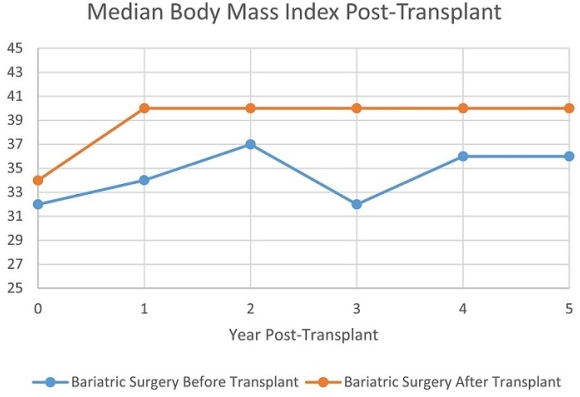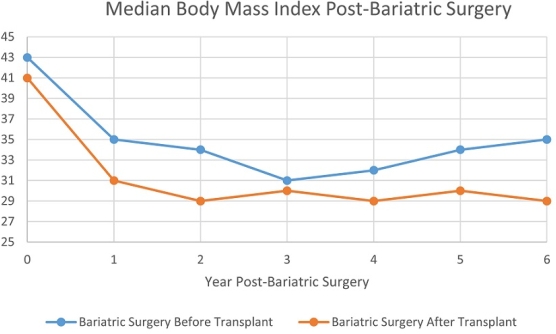Bariatric Surgery before and after Kidney Transplantation: Long-Term Weight-Loss and Allograft Outcomes
J. Cohen, M. Lim, C. Tewksbury, S. Torres Landa, J. Trofe-Clark, P. Abt, N. Williams, K. Dumon, S. Goral.
University of Pennsylvania, Philadelphia.
Meeting: 2018 American Transplant Congress
Abstract number: A199
Keywords: Graft failure, Obesity, Surgical complications, Weight
Session Information
Session Name: Poster Session A: Kidney: Cardiovascular and Metabolic
Session Type: Poster Session
Date: Saturday, June 2, 2018
Session Time: 5:30pm-7:30pm
 Presentation Time: 5:30pm-7:30pm
Presentation Time: 5:30pm-7:30pm
Location: Hall 4EF
Obesity, a critical public health issue affecting >25% of kidney transplant (KTX) candidates, is often a barrier to transplantation. Bariatric surgery is an important tool in facilitating substantial weight loss. Limited data exist evaluating risks and benefits of bariatric surgery before vs after KTX. We performed a single-center retrospective study of 43 patients who had bariatric surgery before KTX and 21 patients who had bariatric surgery after KTX from 1994 to 2017. Patients who had bariatric surgery before KTX were older (median 50 vs 41 years, p<0.01) and more likely to receive lympho-depleting induction (77% vs 52%, p=0.01) and tacrolimus (95% vs 67%, p=0.01), but not maintenance steroids (98% vs. 94%, p=0.52), compared to those who had bariatric surgery after KTX. There was no significant difference in race (28% vs 57% black, p=0.13), dialysis vintage at KTX (500 vs 382 days, p=0.66), or diabetes (44% vs 38%, p=0.71). In the first 5 years after KTX, median BMI (33 vs 38 kg/m2, p=0.02, Figure 1) and HbA1c (5.5% vs 7.1%, p=0.02) were lower in patients who had bariatric surgery before KTX compared to after KTX. There was no significant difference in BMI during the first 5 years after bariatric surgery (36 vs 32 kg/m2, p=0.81, Figure 2). Allograft failure (2% vs 33%, p<0.01), but not mortality (7% vs 14%, p=0.35), was less frequent in patients who had bariatric surgery before KTX vs after KTX. One case of allograft failure was attributed to surgical complications after bariatric surgery. In conclusion, compared to bariatric surgery after KTX, bariatric surgery before KTX does not appear to be associated with substantial delays in transplantation, results in similarly sustained weight loss, and may yield better long-term allograft survival.
CITATION INFORMATION: Cohen J., Lim M., Tewksbury C., Torres Landa S., Trofe-Clark J., Abt P., Williams N., Dumon K., Goral S. Bariatric Surgery before and after Kidney Transplantation: Long-Term Weight-Loss and Allograft Outcomes Am J Transplant. 2017;17 (suppl 3).
To cite this abstract in AMA style:
Cohen J, Lim M, Tewksbury C, Landa STorres, Trofe-Clark J, Abt P, Williams N, Dumon K, Goral S. Bariatric Surgery before and after Kidney Transplantation: Long-Term Weight-Loss and Allograft Outcomes [abstract]. https://atcmeetingabstracts.com/abstract/bariatric-surgery-before-and-after-kidney-transplantation-long-term-weight-loss-and-allograft-outcomes/. Accessed February 25, 2026.« Back to 2018 American Transplant Congress


